
No. 13, 2022 | 30 September 2022
Go to:
From FRSA's Acting Executive Director
With school holidays underway or soon to start around the Country, our Executive Director, Jackie Brady, is enjoying a well-deserved (and long overdue!) break away with her family in Queensland.
Ensuring our workdays are peppered with times of respite and self-care – walks in the wilderness, meeting friends for coffee, quiet time reading a novel – are all important to our mental health and wellbeing. But extended downtime is critical too. After a busy school term, I’ve observed my teenage twins ease into and relish that downtime over the past few days. Unfettered from the 8:50am school bell and homework demands, I can see them visibly relax.
It’s World Mental Health Day on 10 October and the message is clear “Look after your mental health Australia”. Of course, this message speaks not only to looking after our own mental health but also looking after the mental health of our communities.
FRSA members regularly tell us that the children, families and communities they work with are experiencing mental health challenges now more than ever. Poor mental health has been exacerbated by the COVID-19 pandemic and cost of living pressures aren’t helping. I’ve been struck over the past week or so by the number of news articles reflecting on the mental health of our children and young people and the rising cases of school refusal. Kids are feeling anxious and unable to pass through the school gates, or even leave their homes. I wonder what school holidays feel like for them?
As we approach World Mental Health Day, I want to acknowledge the amazing work our members and friends do every day to keep children, young people and families safe, supported and held – especially when external clinical mental health supports are at capacity.
I take this opportunity to put out two reminders:
- Nominations for the FRSA Board close 4pm Friday 7 October (see below)
- Please save the date for our Strategic Leadership Forum, Canberra, 23-24 November 2022. More information on this member-only event will follow in the coming weeks!
Kind regards,
Dr Robyn Clough
FRSA Acting Executive Director
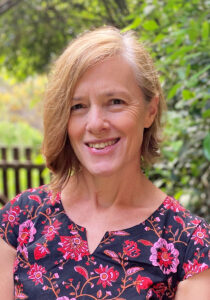
People on income support bear inflationary brunt
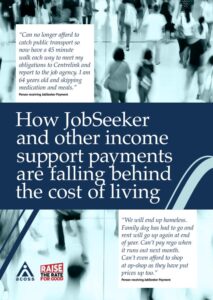 A new report from ACOSS has found that the surging cost of living is having a devastating impact for people on income support, with six in ten eating less or reporting difficulty getting medicine or care.
A new report from ACOSS has found that the surging cost of living is having a devastating impact for people on income support, with six in ten eating less or reporting difficulty getting medicine or care.
The report, How JobSeeker and other income support payments are falling behind the cost of living surveyed 449 people living on JobSeeker, Youth Allowance and Parenting Payment between July and August 2022 to gauge how they are managing to cover the cost of basic goods and services in the face of skyrocketing living costs.
Report key findings include:
- 62% have had difficulty getting medication or medical care due to the increased cost of living.
- 62% are eating less or skipping meals while 71% are cutting back on meat, fresh fruit, and vegetables.
- 96% of people renting privately are in rental stress, paying more than 30% of their income on rent.
- 70% of people who regularly use a car said they had difficulty travelling to work, medical appointments, or other commitments as a result of increased fuel costs.
- More than half (57%) of respondents are shortening or taking fewer showers because of increased energy costs. 7 in 10 are cutting their use of heating.
ACOSS has recommended a range of measures including:
- Lifting income support payments to at least $73 a day.
- Indexing JobSeeker and related payments to wages as well as the Consumer Price Index, to ensure they maintain pace with community living standards over the long term.
- Increasing Commonwealth Rent Assistance by 50% to reduce rental stress, noting housing costs are the biggest household cost.
- Establishing a single parent supplement that recognises the additional costs of single parenthood.
Lockdowns led to lower life satisfaction
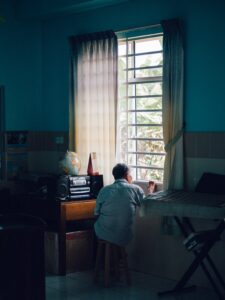 Stricter lockdowns in response to COVID-19 led to higher loss in life satisfaction and worse mental health and wellbeing outcomes, new research from The Australian National University (ANU) shows.
Stricter lockdowns in response to COVID-19 led to higher loss in life satisfaction and worse mental health and wellbeing outcomes, new research from The Australian National University (ANU) shows.
Led by the ANU Centre for Social Research and Methods and using Oxford University’s COVID-19 Stringency Index, the study is the first in Australia to examine the direct links between lockdowns and life satisfaction for the entire COVID-19 period.
The study also found that higher case numbers and deaths caused by COVID-19 had a negative impact on people’s wellbeing, but to a lesser extent than lockdowns.
The study was also able to look at whether the impacts of lockdowns were the same for everyone in Australia. According to co-author Professor Nicholas Biddle, some important differences emerged.
“We found that for males, the strictness of lockdowns had a stronger impact on their life satisfaction. In contrast, among females rising case numbers seemed to be a bigger factor,” he said.
“We also found that COVID-19 policy stringency had a greater impact on young Australians compared to older Australians, and on those states and territories that had multiple waves of infections, namely New South Wales, Victoria and the ACT.”
The study builds on the first comprehensive tracking of the strictness of lockdowns across Australia’s capital cities as well as states and territories.
Read the full study on the impact of lockdowns on Australians’ life satisfaction online.
SMS4Dads new service for First Nations dads
 A new parenting support service for First Nations fathers is now available.
A new parenting support service for First Nations fathers is now available.
SMS4Dads is a free service that delivers child development and parenting support and information to dads via their mobile phones from 12 weeks into a pregnancy and throughout the first year of parenthood. The service is available from anywhere in Australia.
SMS4dads aims to help fathers understand and connect with their baby and partner. It also checks in on their wellbeing and offers professional support if needed.
SMS4dads is also developing tailored messages to send to special groups such as;
- Aboriginal and Torres Strait Islander dads
- dads and their partners who may be experiencing mental health distress
- and dads and their partners who experience the loss of a baby
SMS4DeadlyDads was first developed as a research project at the University of Newcastle. The messages for SMS4DeadlyDads have been co-designed in consultation with an Advisory Group of senior First Nations men representing Aboriginal Controlled Health organisations. View the fact sheet.
Respectful Relationships Education in Australia – National stocktake report released
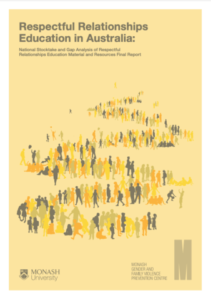
A number of FRSA members deliver respectful relationships programs in their local communities. Encouraging positive, equal and respectful relationships between school students is seen as a preventative measure in addressing violence against women and children.
In August 2021, the Australian Department of Education, Skills and Employment commissioned Monash University to undertake a national stocktake and gap analysis of existing Respectful Relationships Education (RRE) programs and resources. The report of this stocktake has just been released.
The report authors make a number of recommendations to strengthen respectful relationships education in Australia:
- Demonstrates leadership commitment to strengthening RRE in Australian schools
- Ensure classroom ready RRE teachers
- Increase the capacity of educators to teach respectful relationships
- An RRE online professional learning resource hub
- Monitoring, evaluation and continuous improvement of RRE in Australian schools
- A national coordination mechanism for RRE
- A whole-of-system approach to RRE.
ANROWS Webinar: Family law parenting orders, breaches and their impact on children
ANROWS is holding a free webinar on Family law parenting orders, breaches and their impact on children on 24 October 2022 at 1pm-2:30pm (AEDT).
The webinar will launches the second and final report within Compliance with and enforcement of family law parenting orders. Conducted with the Australian Institute of Family Studies, this research examines how the parenting order enforcement regime is working in Australia. It does so by pulling together a range of perspectives, from the views of parents and carers, and legal professionals as well as judicial insights from court files. This research demonstrates that when parenting orders fail to take children’s views into account, or family violence makes them unsafe to comply with, these factors can be drivers of non-compliance.
This webinar features a panel discussion amongst the report’s researchers and family law practitioners. It will focus on the impact of breaches of parenting orders upon children, and explore how the findings might shape future reforms to achieve better outcomes for families with complex needs and long litigation histories.
This webinar is for policymakers, practice designers, practitioners and researchers working in family law, domestic and family violence and child-focused organisations. Find out more or register here.

FRSA lunchtime webinar series – recordings now available!
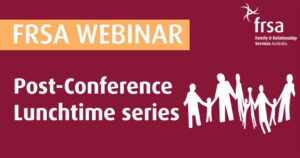
For those that missed out on FRSA’s September lunchtime webinar series, all the recordings are now available on our website.
- Social connecting during a socially distancing pandemic – Lucy Louca, Pronia
Lucy’s presentation was a poignant reminder of the social isolation many faced during COVID lockdowns and the critical role that community service organisations played in keeping people connected, easing their fears and ensuring our CALD communities were getting correct information in their first languages.
- Effective use of Telehealth Delivery in Supporting Children After Separation: Challenges and Solutions – Melanie Weinstock & Josette Gardiner, Better Place Australia
Josette and Melanie’s presentation explored the challenges and solutions their practitioners experienced in the transition to online counselling during COVID-19. Challenges included assessing safety for telehealth sessions where high conflict is present as well as remotely navigating the dynamics of separated and blended families.
- Familial Abuse and Psychosocial Risk Factors in Older First Nations Peoples and People from Culturally and Linguistically Diverse Backgrounds – Anna Gillbard, UnitingCare
Anna’s presentation shared data collected by an elder abuse helpline in Queensland, which was analysed to compare the types of abuse and risk factors of alleged victims from First Nations cultures, culturally and linguistically diverse cultures and other backgrounds. As well as acknowledging ways to better understand risk factors for victims, Anna’s presentation outlined the need to provide more targeted approaches for both awareness raising activities and intervention strategies.
FRSA Board Election nomination process now open
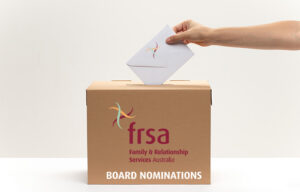 FRSA Board nominations are now open through until 4pm on Friday, 7 October 2022.
FRSA Board nominations are now open through until 4pm on Friday, 7 October 2022.
In 2022/2023, there will be three positions on the FRSA Board open for nomination. The positions which will be declared open are currently held by:
- FRSA Deputy Chairperson, Ms Teresa Jayet
- FRSA Board Member, Paula Washington
- FRSA Board Member, Tony Fitzgerald
The FRSA Board consists of seven member elected directors with provision in the Constitution of up to two co-opted (which are currently filled). Each FRSA Board position is for a two year term (maximum three consecutive terms) with Full Board meetings held approximately four times a year, typically in Canberra, home of the National Office. The work of the Full Board is supported by a number of committees: the Finance, Risk and Governance Committee; the Research and Policy Committee and the Sector Events Committee.
To be eligible for nomination, you must be a director, secretary or employee of a current financial Full Member or a current financial Associate Member of Family and Relationship Services (FRSA). Only Full Members of FRSA, are eligible to nominate. They must also be current financial Members. A Full Member shall not nominate more than one Candidate for Election as a Director. Intending Nominees/Candidates should familiarise themselves with the FRSA Constitution, and verify their financial status and any other qualifications prior to lodging nominations.
For more information regarding the nomination process, please contact on us 02 6162 1811 or via email me at ExecDirector@frsa.org.au.

Consultation Draft – National Principles to Address Coercive Control
On 16 September, the Attorney-General, the Hon Mark Dreyfus, announced a public consultation on the National Principles to Address Coercive Control.
At the recent Meeting of Attorneys-General, all jurisdictions agreed to take collective action to address family, domestic and sexual violence. Progressing the National Principles is an important step towards delivering on this commitment.
The National Principles will help to create a shared national understanding of coercive control – a pattern of abusive behaviour that a perpetrator uses to create and keep power over another person or persons. In turn, it is hoped that a common understanding of coercive control will lead to increased community awareness and increased safety for all Australians, particularly women and children.
The consultation process will involve an online survey, targeted roundtable discussions and further advice from an Advisory Group made up of victim-survivors, family and domestic violence experts, and representatives of people at increased risk of coercive control.
For more information and to provide your feedback on the Consultation Draft visit the Attorney-General’s Department website. The consultation closes on 11 November 2022.
Select Committee on Work and Care – first public hearings held
The Senate Select Committee on Work and Care held its first three public hearings on 16, 20 and 21 September.
The Committee is inquiring into the impact that combining work and care responsibilities has on the wellbeing of workers, carers, and those they care for. It is due to present an interim report by 18 October 2022 and a final report by the second sitting Tuesday in February 2023.
The programs and transcripts of the public hearings are available on the Committee’s webpage.
Women’s economic equality taskforce holds first meeting
The Albanese Government’s Women’s Economic Equality Taskforce met for the first time on 21 September 2022.
Minister for Finance, Senator the Hon Katy Gallagher, said that the taskforce will play an important advisory role to the Government on a range of issues related to driving women’s equality as an economic imperative, including through the National Gender Equality Strategy and the Employment White Paper.
For more information about the taskforce, including a list of taskforce members, see the Minister’s media release.

Men Choosing Change program: Findings of a long-term evaluation webinar
UnitingCare’s latest webinar titled Men Choosing Change program: Findings of a long-term evaluation from 2 September is now available online:
The webinar was on the organisation’s men’s behaviour change program, Men Choosing Change, which has been running for over 12 years and discussed the findings from the recent report Men Choosing Change Evaluation: Longer term program outcomes.
The report is from the final stage of a four year evaluation into the effectiveness of the program conducted by researchers from the Queensland Centre for Domestic and Family Violence Research (QCDFVR) at CQUniversity .
Family Life opens Dandenong office
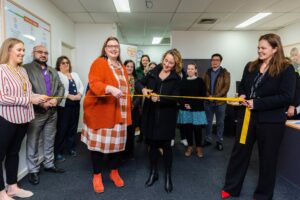 After delivering services in the Dandenong region for over a decade, Family Life celebrated the opening of their new Dandenong Office on 12 September. The service centre was opened by local MP Gabrielle Williams.
After delivering services in the Dandenong region for over a decade, Family Life celebrated the opening of their new Dandenong Office on 12 September. The service centre was opened by local MP Gabrielle Williams.
Congratulations to the Family Life team on the new office!
Specialist reunification foster care program

The Centacare Foster Care program provides out-of-home care placements for vulnerable children with complex needs aged 0-17 years of age who are unable to be placed in relative or kinship care or general foster care.
The program supports the planned process of returning children from out-of-home care placements to the care of their birth families. Read more.

World Mental Health Day
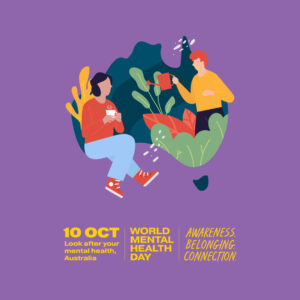 World Mental Health Day is on 10 October 2022. In 2022, the focus of the annual initiative is awareness, belonging and connection. The message is simple: “Look after your mental health, Australia.” Support the campaign by making a #MentalHealthPromise at lookafteryourmentalhealthaustralia.org.au or download resources.
World Mental Health Day is on 10 October 2022. In 2022, the focus of the annual initiative is awareness, belonging and connection. The message is simple: “Look after your mental health, Australia.” Support the campaign by making a #MentalHealthPromise at lookafteryourmentalhealthaustralia.org.au or download resources.
Our Watch ‘test and learn’ campaign
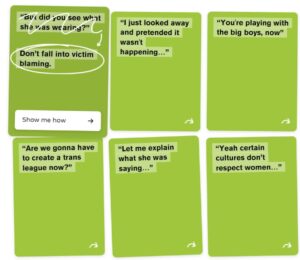 Our Watch has launched their national social media ‘test and learn’ campaign to learn more about what helps people understand violence against women, gender inequality, and the link between the two.
Our Watch has launched their national social media ‘test and learn’ campaign to learn more about what helps people understand violence against women, gender inequality, and the link between the two.
The campaign aims to explain the drivers of violence against women through examples of gender inequality that are recognisable and actionable.
The test and learn campaign also captures the audience’s commitment to a range of actions that address and prevent gender inequality.
Our Watch will use insights collected from this initiative to help inform future campaigns, with the aim of further shifting attitudes and changing behaviours that drive violence against women.
Mental Health at the Margins survey
 Calling all people from diverse and multiple intersectional communities!
Calling all people from diverse and multiple intersectional communities!
Drummond Street Services is working on a project called Mental Health at the Margins, which aims to improve and support mental health service experiences among diverse communities with intersecting identities.
They are looking for people from diverse communities to share their lived experiences related to mental health services. Click here to complete the survey. You will also have the opportunity at the end of the survey to join a co-design group and be involved in the project – if you do, you will be paid for your time. Download a copy of the flyer
ReachOut: Youth Issues Survey - Participants wanted
 ReachOut is conducting a survey of young people to better understand how the issues that concern them are impacting on their mental health and wellbeing. They are running this study to elevate the voices of young people regarding their experiences of day-to-day challenges and how these might impact their mental health and wellbeing. They are also exploring how young people would like to be supported when things get tough. This research will help ReachOut and the broader mental health sector to better understand the challenges facing young people and what supports they need.
ReachOut is conducting a survey of young people to better understand how the issues that concern them are impacting on their mental health and wellbeing. They are running this study to elevate the voices of young people regarding their experiences of day-to-day challenges and how these might impact their mental health and wellbeing. They are also exploring how young people would like to be supported when things get tough. This research will help ReachOut and the broader mental health sector to better understand the challenges facing young people and what supports they need.
Australian Community Sector Survey extended
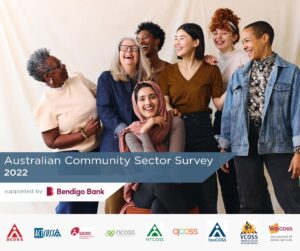 ACOSS has extended the closing date of the Australian Community Sector Survey for 2022 to 7 October 2022. The more data ACOSS has on the state of the sector, the more compelling their advocacy to the government will be. The survey takes 10-15 minutes to complete and the research will help ACOSS deliver long-lasting benefits for the sector.
ACOSS has extended the closing date of the Australian Community Sector Survey for 2022 to 7 October 2022. The more data ACOSS has on the state of the sector, the more compelling their advocacy to the government will be. The survey takes 10-15 minutes to complete and the research will help ACOSS deliver long-lasting benefits for the sector.
National Carers Week
 National Carers Week 2022 is coming up on 16-22 October. The week is an opportunity to recognise, celebrate, and raise awareness among all Australians about the diversity of Australia’s 2.65 million carers and their caring roles.
National Carers Week 2022 is coming up on 16-22 October. The week is an opportunity to recognise, celebrate, and raise awareness among all Australians about the diversity of Australia’s 2.65 million carers and their caring roles.
Help raise awareness this National Carers Week by inviting workmates, friends and family to an event to raise awareness of the diversity of carers and caring roles in Australia.
Organise a morning or afternoon tea, fundraiser or workshop to help recognise carers, identify what caring looks like, and find out what supports and services are available to carers. Click here to find out more about the week and how to get involved.
Effective Online Group Leadership Workshop
SUNSHINE CIRCLES – Albury
SUNSHINE CIRCLES – Shepparton
HEY LITTLE WARRIOR – Sale
How infant-led practice in family violence settings can nurture hope for infants and families webinar | Australian Institute of Family Studies & Emerging Minds | Wednesday 12 October | 12:30pm-2:30pm AEDT
This webinar will explore how infant led interventions can nurture hope, discovery and recovery for infant and parent within context of family and domestic violence.
NT
Family Dispute Resolution Practitioner | Relationships Australia NT
Counsellor (Family and Relationship Services) | Relationships Australia NT
Manager Counselling – Family and Relationship Services | Relationships Australia NT
VIC
Family Relationship Counsellor – Child Practitioner | Relationship Matters
Family Violence Practitioner and Men’s Case Management – Sunshine | Relationships Australia Victoria
NSW
Practice Manager, Post Separation Services (Wagga Wagga) | Relationships Australia Canberra and Region
Relationship Counsellor | Relationships Australia NSW
Counsellor | Relationships Australia NSW
QLD
If you have any events you’d like listed on the FRSA Events and Training Calendar or job vacancies you’d like listed on the FRSA Jobs Board, email Communications Officer, Vanessa Lam at communications@frsa.org.au. Please note that posting onto the FRSA website is reserved for FRSA Members only.

Ageing in place: home and housing for Australia’s older renters | Anglicare Australia
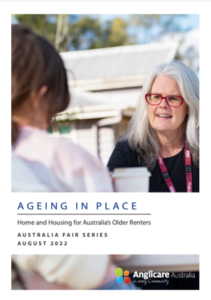 This report explores how Australians want to age and the barriers they face to staying at home, especially for renters. It presents the findings of a survey that looked at older people’s preferences around ageing at home.
This report explores how Australians want to age and the barriers they face to staying at home, especially for renters. It presents the findings of a survey that looked at older people’s preferences around ageing at home.
How do place-based services evolve in a world of virtual, physical and hybrid service delivery? | Australia and New Zealand School of Government
This paper details emerging considerations for governments in designing and delivering hybrid (i.e. virtual and face-to-face) services and hybrid place-based initiatives specifically in relation to social services.
Aftershock – Domestic and Family Violence | NCOSS
This latest report focuses on the increasing rates of domestic and family violence (DFV) in NSW, conservatively estimated to cost our economy up to $24.6 billion over five years, as a result of the 2020 lockdown alone. The report highlights the disproportionately high rates of DFV for women with disability and Aboriginal and Torres Strait Islander women who are also more at risk from the impacts of natural disasters.
It points to policy initiatives and investment decisions that would mitigate these impacts and lessen the long-term consequences of increased domestic and family violence in NSW.
Evidence-informed approaches to practice | Australian Institute of Family Studies
AIFS have shared a a selection of resources on the role of research in decision-making to support you to use evidence in your practice.
A plan to end homelessness in Victoria | Council to Homeless Persons
The Victorian state election in November 2022 creates an opportunity for Victorians to encourage decision makers to make the changes needed to end homelessness. This position paper calls on the next Victorian government to implement 27 changes that would help to end homelessness.
Truth is, the abuse never stopped | Barnardos Australia
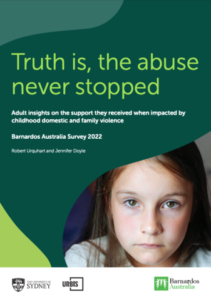 The primary purpose of this research project has been to consult adult victim survivors who experienced domestic and family violence in their childhood or youth, so that we can better understand their situation and support needs at that time. This report presents findings from that survey.
The primary purpose of this research project has been to consult adult victim survivors who experienced domestic and family violence in their childhood or youth, so that we can better understand their situation and support needs at that time. This report presents findings from that survey.
Partners in recovery: moving beyond the crisis? | Centre for Social Impact
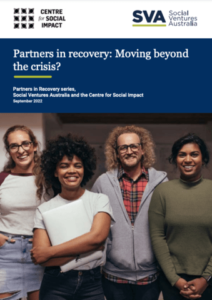 This report examines the role of charities in Australian communities, the impact of COVID-19 on charities, their financial health, and the challenges they face in the months and years ahead.
This report examines the role of charities in Australian communities, the impact of COVID-19 on charities, their financial health, and the challenges they face in the months and years ahead.
Resources for engaging vulnerable families | Australian Education Research Organisation
New resources have been released, by AERO, with strategies to engage families with children in out-of-home care and those from culturally and linguistically diverse backgrounds. The guides are aimed at supporting better learning outcomes for children.
Gendered injustice: The policing and criminalisation of victim-survivors of domestic and family violence | Fitzroy Legal Service
This research explores how women who experience a range of social, economic, health and legal issues – including but not limited to DFV – become caught up in the criminal legal system.
Wellbeing outcomes in Australia as lockdowns ease and cases increase – August 2022 | Centre for Social Research and Methods (ANU)
The aim of this paper is to examine the trends and determinants of wellbeing over the COVID-19 period, making use of the 12 waves of the COVID-19 Impact Monitoring Survey data and with a particular focus on the 12 months since August 2021.
Want to submit something to the FRSA eBulletin?
If you have an news item or event that you would like to be featured in a future eBulletin please submit your announcement via the form below or email communications@frsa.org.au with the subject “FRSA eBulletin submission”.
Please note FRSA members receive priority for items posted in the eBulletin. And to keep information current, relevant and useful, submissions will not be repeated from week to week.
Subscribe
Subscribe to receive future eBulletin editions directly to your inbox!






